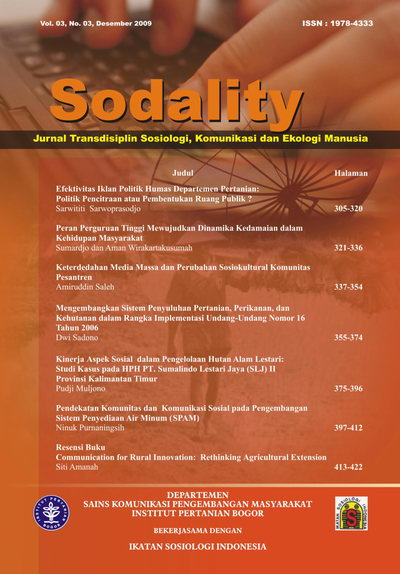Efektivitas Iklan Politik Humas Departemen Pertanian: Politik Pencitraan atau Pembentukan Ruang Publik ?
Abstract
The objective of this article is to show how political advertisement as published by public relation activities has a deep effect on the change of farmers’ welfare image. The study was carried out to see how far the message contained in political advertisement been in contradictive with farmers’ public opinion. The contradiction normally appeared due to the ways the message was packaged. Normally the message was felt to be very plain as they were built by government and political interest, and bureaucratic flavors. Meanwhile public opinion was normally built in the fortitude of criticizing the government. Public opinion was also influenced by social status, gender, as well as social and political economic context as normally faced by their day to day life. Theoretical implication of this study is, that political advertisement concept needs to integrate participatory development communication. Some practical implication of the study showed that public relation activity needs to integrate development communication concept as well as good governance principles as they became most important Indonesian Government political jargons. Methodologically, this research has an important implication on how to measure government pubic relation effectiveness under good governance framework.
Published
2009-12-15
How to Cite
SarwoprasodjoS. (2009). Efektivitas Iklan Politik Humas Departemen Pertanian: Politik Pencitraan atau Pembentukan Ruang Publik ?. Sodality: Jurnal Sosiologi Pedesaan, 3(3). https://doi.org/10.22500/sodality.v3i3.5861
Section
Articles
Authors who publish with this journal agree to the following terms:
- Authors retain copyright and grant the journal right of first publication with the work simultaneously licensed under a

This work is licensed under a Creative Commons Attribution 4.0 International License. that allows others to share the work with an acknowledgement of the work's authorship and initial publication in this journal. - Authors are able to enter into separate, additional contractual arrangements for the non-exclusive distribution of the journal's published version of the work (e.g., post it to an institutional repository or publish it in a book), with an acknowledgement of its initial publication in this journal.
- Authors are permitted and encouraged to post their work online (e.g., in institutional repositories or on their website) prior to and during the submission process, as it can lead to productive exchanges, as well as earlier and greater citation of published work (See The Effect of Open Access).





.png)









